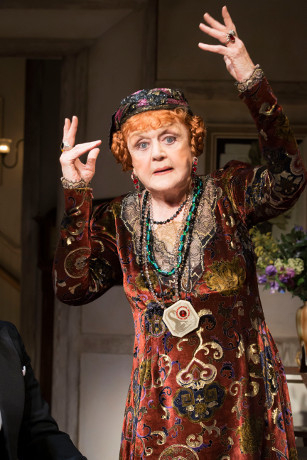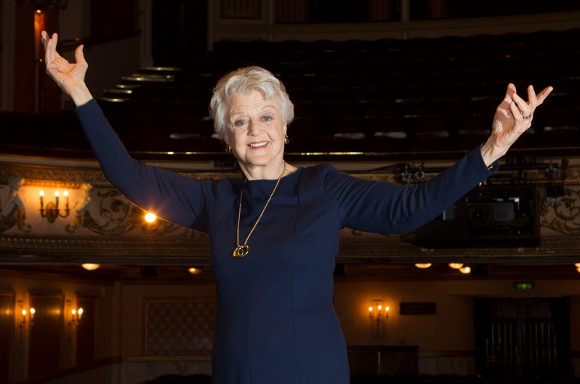Blithe Spirit (Gielgud Theatre)
Five years after she played Madame Arcati on Broadway – and 40 years after she last appeared here, unforgettably, in Gypsy, and also as Gertrude opposite Albert Finney's Hamlet at the National – Angela Lansbury returns in triumph to the West End in the same role, again directed by Michael Blakemore; she's an incredible 88 years young, while Blakemore's a mere stripling at 85.
I can't recall a jollier geriatric evening – the show is notably well cast in the "youngster" department, too, with Charles Edwards as the smug novelist Charles Condomine and Janie Dee and Jemima Rooper as his two wives, one living, one dead – and it belongs, though not exclusively, to Lansbury as the meddling gypsy medium in her elegant bohemian velvet dress and glittery brocaded jacket.
There are two circular tresses clamped to her auburn hair like earphones, a pair of audio bicycle clips, perhaps. When summoning the dead, Lansbury goes into a hieratic, jerky sand-dance, hilarious and strangely expressive, with a flurry of bendy wrist movements and come-hither signals; after surfacing from her final trance, and causing another ectoplasmic manifestation, she briskly declares that she's bicycling home: "It's only eight miles."
There's something weird, beautiful and disturbing about this Arcati, a lovable gorgon who's gone way beyond mere eccentricity. She stares down the giggles of the doctor's wife (Serena Evans) with contempt, drifting away into a bubble of self-congratulation; the way she acts an eyeful of muttering I've only seen done as well by Alastair Sim or Michael Hordern.
Coward wrote his immortal comedy of death in just five days during the war, and it's been one of his most popular plays ever since (second only to Private Lives), not only because of its then topical satire of séances and psycho-babble, but because of its acid and brilliantly dynamic treatment of love and disharmony in the ever-shifting marital triangle.
And also because of the idea that death neither dissolves or resolves anything in tenacious relationships. You can see where Pinter got the idea for Old Times from (he himself did an exceptional revival of Blithe Spirit at the National in 1976, with a majestic Elizabeth Spriggs as Arcati): Ruth and Elvira are competing for Charles in his own memory of them.
And in the unexpectedly reversed casting of the irresistible Rooper as a mischievous, emphatically non-ethereal Elvira, and the languidly beguiling Dee as a seductive and demanding Ruth, the comedy is enriched with still more ambiguity and confusion.
On Broadway, Rupert Everett must have been a little more dashing as the novelist who is using Madame Arcati as a research facility (hence the justice of her accidental revenge on him), but Edwards is probably closer to the stuffed shirt character Coward actually wrote, and he's very funny both in repose and on the attack.
Simon Jones repeats his Broadway performance as the stolid Dr Bradman, while non-stop Patsy Ferran makes a lovely debut as the quick-quick-slow maid who stands too close to employees and guests alike and proves a surprising link in the story late on.
Simon Higlett's spacious design of the Kentish wooden-beamed living room, and Mark Jonathan's lighting, deliver the right ghostly goods throughout, and in the scenic calamity at the end as Charles strikes out from all the women in his life, free at last (possibly).
And the great rhythmic row scene between Charles and Elvira in the third act – the play is chopped down the middle and given in two halves, alas, scenes divided by projected stage directions and Coward songs recorded by Christine Ebersole – takes off like a rocket: "Nobody but a monumental bore would have thought of having a honeymoon at Budleigh Salterton." Quite so.












